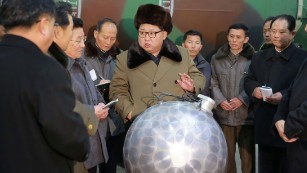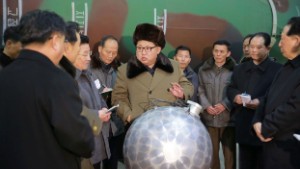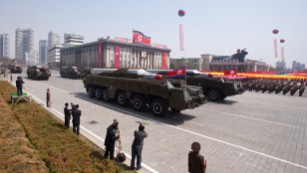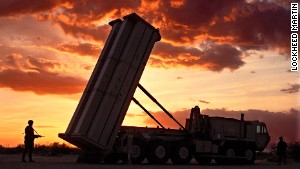US detects failed North Korean ballistic missile launch
US Strategic Command systems detected a failed North Korean ballistic missile launch Saturday evening near the northwestern city of Kusong, the Pentagon said.
"We strongly condemn this and North Korea's other recent missile tests, which violate UN Security Council resolutions explicitly prohibiting North Korea's launches using ballistic missile technology," Pentagon spokesman Gary Ross said in a statement.
The North American Aerospace Defense Command (NORAD) determined the missile launch from North Korea did not pose a threat to North America.
Washington called on Pyongyang to "refrain from actions that further raise tensions in the region," Ross said.
"This provocation only serves to increase the international community's resolve to counter the DPRK's prohibited activities, including through implementing existing UN Security Council sanctions," he said. "Our commitment to the defense of our allies, including the Republic of Korea and Japan, in the face of these threats, is ironclad."
'Provocative act'
South Korea's Joint Chiefs of Staff said that Washington and Seoul had shared information about the failed missile launch.
In a statement, it said the test was a "clear violation" of a UN Security Council resolution. It strongly condemned North Korea's "provocative act" and said South Korea's military was "prepared" for any more provocations.
The Pentagon and South Korea said the missile was presumed to be a Musudan intermediate-range ballistic missile. Musadan missiles are capable of reaching Japan and Guam, according to the Center for Strategic and International Studies.
Recent missile tests
North Korea has had mixed results with the Musadan missile, according to CSIS.
Four tests of the missile, in April and May, failed, CSIS said. Two more tests came in June, with the first missile breaking up in the air and the second traveling 400 km (250 miles) and falling into the Sea of Japan, CSIS said.
Last month, three ballistic missiles fired from a base in the west of North Korea flew across the country and fell into the East Sea, also known as the Sea of Japan.
Will North Korea admit defeat after missile failures?
All three landed within 250 km (155 miles) of Japan's Okushiri Island, the country's Defense Ministry said in a statement.

Former U.S. official: Obama policy on N.Korea will fail
US President Barack Obama and South Korean President Park Geun-hye jointly condemned that launch -- which came less than two weeks after Pyongyangtest-fired a submarine-launched ballistic missile -- promising "more effective" sanctions against the country.
Pyongyang followed the September missile launch with the test explosion of a nuclear warhead later that week.
Tensions have increased considerably on the peninsula since Pyongyang allegedly successfully tested a hydrogen bomb in January.
Missile defense
Are North Korea's missile tests a practice run for evading THAAD?
South Korea has been negotiating with the US todeploy the Terminal High Altitude Area Defense system(THAAD) to protect itself from its northern neighbor, with whom it remains technically at war.
Seoul says THAAD is expected to be fully deployed by the end of 2017.
But while any missile that passes Seoul's defenses would be potentially devastating for those in its path, the true threat posed by North Korea to its neighbors comes from its purported ability to equip such weapons with nuclear warheads.
Pyongyang claimed in March that it had successfully miniaturized nuclear warheads, a crucial step for their mounting on an intermediate or long range missile. US officials said it was "prudent" to take North Korea's word regarding this development.
News Courtesy: www.cnn.com













